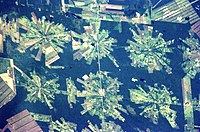
Photo from wikipedia
This study aims to determine the effects of deforestation, economic growth, and urbanization on carbon dioxide (CO 2 ) emissions levels in the South and Southeast Asian (SSEA) regions for… Click to show full abstract
This study aims to determine the effects of deforestation, economic growth, and urbanization on carbon dioxide (CO 2 ) emissions levels in the South and Southeast Asian (SSEA) regions for the 1990–2014 period. The data was divided into five sub-panels. Three of them are income-based groups (namely low-, middle- and high-income panels), and the remaining two are South and Southeast Asian regions. The Pedroni cointegration test confirms a long-run relationship between deforestation, economic growth, urbanization, and CO 2 emissions in the SSEA regions. Further, empirical results reveal the existence of a U-shaped relationship between CO 2 emissions and economic growth for all panels (excepting low-income countries). This means that these countries can grow in a sustainable path, but they must be aware of long-term risks of this economic growth, as this sustainable path could be compromised when reaching the turning point of the “U”. Moreover, our results suggest that deforestation and urbanization can aggravate environmental pollution in these regions and can further affect sustainable development in the long run. Besides, the most appropriate and cost-effective method to minimize CO 2 emissions is found to be through the improvement of forest activities.
Journal Title: Environmental Science and Pollution Research
Year Published: 2020
Link to full text (if available)
Share on Social Media: Sign Up to like & get
recommendations!